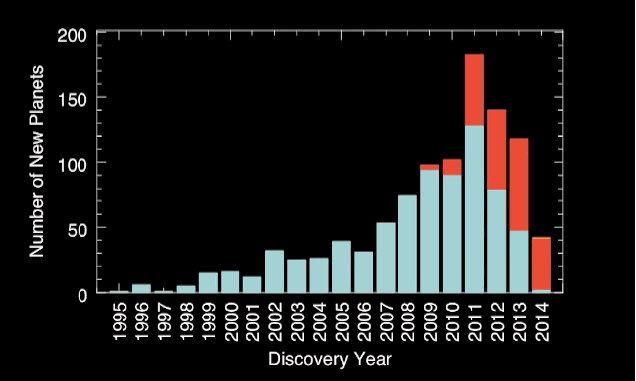
Marcy put it more bluntly:Â “Everybody,” he said, “said I was crazy.”
Fast-forward to February of 2014, when NASA’s Kepler mission announced the discovery of 715 (715!) exoplanets. (A “planet bonanza,” NASA called it.) The new-to-us bodies orbit more than 300 stars. At least some of them—like Kepler 186-f—are strikingly similar to Earth.
Kepler launched in 2009, with a mission to survey more than 100,000
stars that are similar to our sun for the fluctuations in brightness that may be produced by planetary transits. The goal was to obtain an estimate of the percentage of stars with potentially habitable planets. And while the Kepler telescope experienced a fairly heartbreaking mechanical failure earlier this year, making it unable to continue the search for new exoplanets, it’s striking how much we learned from Kepler during the short time it operated. We’re stilllearning from it. (Even though NASA couldn’t find a way to repair Kepler,engineers figured out how to repurpose the telescope so that faraway planet detection is still possible.)
Consider Knack, a tiny start-up based in Silicon Valley. Knack makes app-based video games, among them Dungeon Scrawl, a quest game requiring the player to navigate a maze and solve puzzles, and Wasabi Waiter, which involves delivering the right sushi to the right customer at an increasingly crowded happy hour. These games aren’t just for play: they’ve been designed by a team of neuroscientists, psychologists, and data scientists to suss out human potential. Play one of them for just 20 minutes, says Guy Halfteck, Knack’s founder, and you’ll generate several megabytes of data, exponentially more than what’s collected by the SAT or a personality test. How long you hesitate before taking every action, the sequence of actions you take, how you solve problems—all of these factors and many more are logged as you play, and then are used to analyze your creativity, your persistence, your capacity to learn quickly from mistakes, your ability to prioritize, and even your social intelligence and personality. The end result, Halfteck says, is a high-resolution portrait of your psyche and intellect, and an assessment of your potential as a leader or an innovator.
The Furby, launched in the 1990s, was designed to evoke similar emotions. Furry, talkative and exhaustingly needy, Furbies yearned for love and care. In this Radiolab podcast, Furby co-creator Caleb Chung explains that Furbies were designed to appeal to human beings’ innate sense of compassion by sounding scared when held upside down, or by quivering at loud noises.
Quaint, you might think, and something that only small children would do. But consider the soldiers in Iraq and Afghanistan who gave funerals to combat robots when they were irreparably damaged. That machines provoke strong emotional connections with us is not the preserve of children.
“Dope is not really a magical boost as much as it is a way to control against declines,†Hamilton writes. Doping meant that cyclists finally could train as hard as they wanted. It was the means by which pudgy underdogs could compete with natural wonders. “People think doping is for lazy people who want to avoid hard work,†Hamilton writes. For many riders, the opposite was true:EPO granted the ability to suffer more; to push yourself farther and harder than you’d ever imagined, in both training and racing. It rewarded precisely what I was good at: having a great work ethic, pushing myself to the limit and past it. I felt almost giddy: this was a new landscape. I began to see races differently. They weren’t rolls of the genetic dice, or who happened to be on form that day. They didn’t depend on who you were. They depended on what you did—how hard you worked, how attentive and professional you were in your preparation.This is a long way from the exploits of genial old men living among the pristine pines of northern Finland. It is a vision of sports in which the object of competition is to use science, intelligence, and sheer will to conquer natural difference. Hamilton and Armstrong may simply be athletes who regard this kind of achievement as worthier than the gold medals of a man with the dumb luck to be born with a random genetic mutation.
